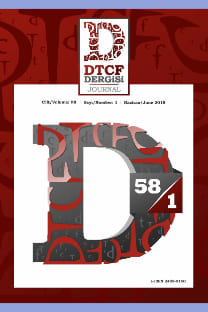PASSAGES OF ECONOMIC MIGRANTS IN CARYL PHILLIPS' THE FINAL PASSAGE AND TÜRKLER ALMANYA'DA BY BEKIR YILDIZ
PASSAGES OF ECONOMIC MIGRANTS IN CARYL PHILLIPS' THE FINAL PASSAGE AND TÜRKLER ALMANYA'DA BY BEKIR YILDIZ
___
- Abadan-Unat, N. (2002). Bitmeyen göç: Konuk işçilikten ulus-ötesi yurttaşlığa. İstanbul: Bilgi Üniversitesi Yayınları.
- Acar, Ü. (2020). Avrupalı Türklerin yabancı düşmanlığına ve asimilasyona karşı kimlik mücadelesi. Academic Journal of History and Idea, 7(1), 328-354.
- Bishop, J. and McLean, D. (2007, August 25). (Re) Rooted: An Interview with Caryl Phillips. Calabash: A Journal of Caribbean Arts and Letters, 4(2), 139-154.
- Brah, A. (1996). Cartographies of diaspora: Contesting identities. London: Routledge. Cross, M. and Entzinger, H. (1988). Caribbean minorities in Britain and the Netherlands: Comparative questions. In M. Cross and H. Entzinger (Eds.), Lost illusions: Caribbean minorities in Britain and the Netherlands (pp. 1-33). London: Routledge.
- Cross, M. and Johnson, M. (1988). Mobility denied: Afro-Caribbean labour and the British economy. In M. Cross and H. Entzinger (Eds.), Lost illusions: Caribbean minorities in Britain and the Netherlands (pp. 73-105). London: Routledge.
- Erol, B. (2019). Destination England: Buchi Emecheta’s second class citizen and Caryl Phillips’s the final passage. Neohelicon, 46, 591–599. https://doi.org/10.1007/s11059-019-00492-3
- Hennesy, A. (1988). Workers of the night: West Indians in Britain. In M. Cross and H. Entzinger (Eds.), Lost illusions: Caribbean minorities in Britain and the Netherlands (pp. 36-53). London: Routledge.
- Kutlay, K. Ş. (2017). Almanya’nin Türk işçileri kabulünden günümüze kadar olan süreçte Almanya’da yaşayan Türklerin yaşadıkları kimlik problemlerinin değişimi üzerine bir araştırma. Turkish Studies International Periodical for the Languages, Literature and History of Turkish or Turkic, 12 (13), 547-556. http://dx.doi.org/10.7827/TurkishStudies.11898
- Maier, A.I. (2013). Home and exile in Caryl Phillips’ the final passage. Studia Ubb Philologia, LVIII(3), 127-139.
- Martin, P. L. (1996). Immigration and integration: Challenges for the 1990s. In J. Tanton et al. (Eds.) Immigration and the social contact: The implosion of Western societies (pp. 27-34). Averbury: Hants.
- McFarlane, E. (2009). From guest workers to permanent residents: German history, citizenship reform, and Germany’s Turkish immigrant population. Interdisciplinary Undergraduate Law Journal, 2, 53-89.
- McLeod, J. (2000). Beginning postcolonialism. Manchester: Manchester UP.
- Modood, T., Berthoud, R., Lakey, J., Nazroo, J., Smith, P., Virdee, S., and Beishon, S. (1997). Ethnic minorities in Britain. Policy Studies Institute.
- Mueller, C. (2006). Integrating Turkish communities: A German dilemma. Population Research and Policy Review, 25(5/6), 419-441.
- Oner, S. (2014). Turkish community in Germany and the role of Turkish community organisations. European Scientific Journal, 10(29), 72-88.
- Orendt, M. (2010). The integration of the Turks into German society: Turks on their way to parallel societies or to true integration? Bilge Strateji, 2(3), 165-182.
- Pangmeshi, A. (2013). Signals of trauma and exilic consciousness in Caryl Phillips’ the final passage. Labyrinth, 4(3), 186-193.
- Pekin, H. (1989). Göç, dışarda çalışma, geri dönüş, hakların örgütlü korunması ihtiyacı. In Y. Fincancı (Ed.). 30. yılında yurtdışındaki Türkler: Varolma savaşımının anatomisi, Zentrum für Turkeistudien - Centre for Turkey studies conference proceedings, 24-25 October 1989 (pp. 56-71). İstanbul: Anadolu Matbaa.
- Phillips, C. (1985). The final passage. London: Faber and Faber.
- Ratcliffe, P. (1988). Race, class, and residence: Afro-Caribbean households in Britain. In M. Cross and H. Entzinger (Eds.), Lost illusions: Caribbean minorities in Britain and the Netherlands (pp. 126-146). London: Routledge.
- Silku, R. K. (2009). Postcolonial routes and diasporic identities: Belonging and displacement in Caryl Phillips’s the final passage and a distant shore. Journal of Postcolonial Writing, 45 (2), 163-170.
- Şen, F. (2003). The historical situation of Turkish migrants in Germany, immigrants & minorities. Historical Studies in Ethnicity, Migration and Diaspora, 22 (2-3), 208-227. DOI: 10.1080/0261928042000244835
- Yıldız, B. (2002). Türkler Almanya’da. İstanbul: Everest. (Original work published 1966).
- ISSN: 0378-2905
- Yayın Aralığı: Yılda 2 Sayı
- Başlangıç: 1942
- Yayıncı: Ankara Üniversitesi Dil ve Tarih-Coğrafya Fakültesi
PETRA DELICADO POLİSİYE ROMAN SERİSİNDE İSPANYOL FEMİNİZMİNİN İZLERİNİ SÜRMEK
SUBHİ EDHEM'İN BEŞER VE TABİAT DERGİSİNDEKİ BİLİMSEL VE ELEŞTİREL YAZILARI
ANKYRA ÇEVRESİNDE ROMA DÖNEMİ İZLERİ
ÇOCUK YAZINI ÇEVİRİSİNDE SES YANSIMALARI
BİR ÖYKÜ ÇÖMLEKÇİSİ: MAZHAR UL ISLAM (MAZHAR UL ISLAM'IN ÖYKÜLERİNDE TEMEL ÜSLÛP ÖZELLİKLERİ)
Davut ŞAHBAZ, Angelica D'ALESSANDRI
MEKÂN OLARAK MUTFAĞIN SOSYAL KULLANIMI VE MUTFAK PRATİKLERİ: ANKARA ÖRNEĞİ
MARİ KRALİYET BELGELERİNDE SU TAŞKINLARI İLE BARAJ/BENT YAPIMI VE TAMİRATINA İLİŞKİN KAYITLAR
İrfan ALBAYRAK, Esma ÖZ KİRİŞ, Hakan EROL
ABDÜLHAMİD HAN'IN GÖLGESİNDE İTALYANLAR VE BAZI AVRUPALI SANATÇILAR
SUSKUNLUĞU BOZMAK: PAT BARKER'IN KIZLARIN SUSKUNLUĞU ROMANINDA ÖZNE OLARAK KADIN
ENVAİÇEŞİT ÜRÜNLER: İBRET VE HADİKA GAZETELERİNDE REKLAMLAR VE BU GAZETELERİN OKUYUCU KİTLESİ
